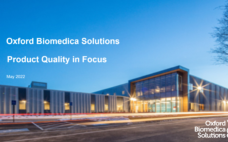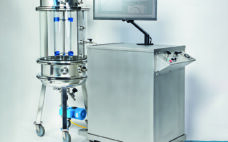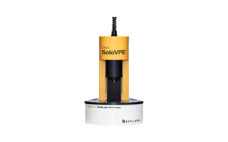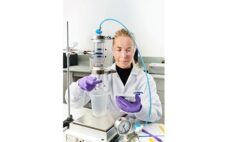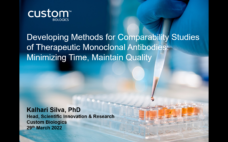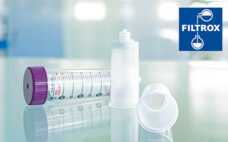This webcast features: Tim Kelly, CEO, Oxford Biomedica Solutions. It is now fully apparent that product quality is critical to the performance of gene therapy products. In turn, regulatory expectations have risen dramatically for the quality of the viral vectors that are used to deliver such therapies. That said, yields from viral-vector production processes tend to be much lower than those for conventional protein products. The ability to address all aspects of product quality while still achieving high vector output…
Author Archives: BPI Contributor
The Critical Role of Predictive Bioreactor Characterization in Pharmaceutical Process-based Upscaling
In bioreactors, microorganisms or cell cultures produce complex therapeutic proteins and other biopharmaceuticals. The industrial production of those active pharmaceutical ingredients usually involves a seed train: the cells are run through many cultivation systems, which become larger with each passage (Upstream Process). An adequate number of cells for the inoculation of large-scale production bioreactors of 10,000 liters or more is generated. A prominent example from the growing mammalian cell culture processing sector is the upstream production process of monoclonal antibodies.…
The Critical Role of Cell Culture Media Analysis in Cell and Gene Therapies Development
This webcast features: Graziella Piras, PhD, Bioprocessing Segment Director, 908 Devices. Unlike biotherapeutic proteins that benefit from decades of development and manufacturing experience, cell and gene therapies are still young. Producing these diverse therapeutics requires that various cells be used based on the specific application. Since various cells have different requirements, the medium used to culture them must be designed for optimal growth and/or productivity of each cell type. When the composition of the cell culture medium does not match…
Minimize Risk With Rapid At-Line Concentration Measurement in Downstream Bioprocessing Applications
This webcast features: Paul Mania, Bioanalytics Applications Specialist, Repligen. Traditional UV/Vis spectroscopy uses fixed pathlengths to measure different analytes, such as nucleic acids, proteins, and cells from biological samples. These samples are often limited in volume or highly concentrated, which presents various challenges. The CTech™ SoloVPE® System uses a patented variable pathlength technology (VPT) to accurately measure the targeted concentration of various analytes. The system measures concentrations without being dependent on sample volume or sample concentration, removing any dilution requirements,…
Developing a Platform for Large-Scale Lentiviral Manufacture
This webcast features: Yiyu Dong, PhD, Associate Director of Viral Vector Process Technology Development (VVPTD), WuXi Advanced Therapies. Due to their capability for long-term transgene expression, large packaging capacity and ability to transduce postmitotic and quiescent cells, lentiviral vectors have become increasingly popular gene delivery tools for cell and gene therapies in recent years. However, capacity for lentiviral vector manufacture is a major industry bottleneck. WuXi Advanced Therapies has developed a lentiviral suspension manufacturing platform using OXGENE’s XLenti™ packaging plasmids.…
Rapid Process Development: How a Synthetic Depth Filter Offers a Platform Approach for Efficient Virus Filtration Operations
Virus filtration is a critical unit operation in recombinant protein purification processes. Process development of virus filtration operations typically strives to maximize filter capacity and improve process robustness. Adsorptive prefilters are often used to remove higher order protein aggregates and improve filter capacity. While adsorptive membrane prefilters offer easy scale up and implementation, their narrow operating window may result in extensive process development screening studies. By contrast, synthetic depth filters offer a wide operating window and the potential for a…
Drug Discovery: Screening Approaches for Rapid Assessment of Target Tractability
This webcast features: Nuska Tschammer, Head of DEL Lab Operations, WuXi AppTec. In recent years, increasing use of genetic, transcriptional and knock-out technologies led to numerous biologically validated targets, many of them in the category “first-in-class”. The core purpose of experimentally based tractability assessments is to evaluate if the target of interest can be modulated by a chemical entity. In the past, extensive HTS screening efforts were initiated to find starting points for the small molecule drug discovery. Today, direct…
Not All cGMP Transfection Reagents Are Made Equal: Pharmaceutical Versus Medical Device cGMP Manufacturing
cGMP grade transfection reagents should be produced and formulated following strict guidelines. Some suppliers manufacture transfection reagents according to medical devices cGMP standards which makes the reagents suitable for viral vector manufacturing in the United States but not suitable for direct administration into humans. Those are often labelled as “for research use only and further manufacturing. Not for use in humans or animals”. Others comply to pharmaceuticals cGMP guidelines, making the transfection reagent suitable for viral vector manufacturing as well…
Developing Methods for Comparability Studies of Therapeutic Monoclonal Antibodies: Minimize Time, Maintain Quality
This webcast features: Kalhari Silva, PhD, Head of Scientific Research, Custom Biologics, and Bob Dass, PhD, Senior Scientist, Octet Applications, Sartorius. Quantifying critical quality attributes accurately and precisely is an important aspect of regulatory compliance. There is greater demand to optimize processes by integrating advanced analytical tools that maximize quality, safety, and efficacy of biotherapeutics. Kalhari Silva, from Custom Biologics, will provide insight on how her team designs and establishes methods suitable for comparability studies that allow for their future…
Lab Scale Depth Filtration with FILTROSPIN™ 20
FILTROSPIN™ 20 by FILTROX enables you to quickly and efficiently test different depth filters or quickly purify a small amount of liquid. The filters are inserted into standard 50 mL centrifuge tubes (Labcon® SuperClear® 50 mL tubes). The liquid is then filtered using a centrifuge or vacuum. In order to evaluate the most suitable and optimized production process, small-scale trials are the key factor to start with. With the help of laboratory scale trials, errors and other issues can be…

